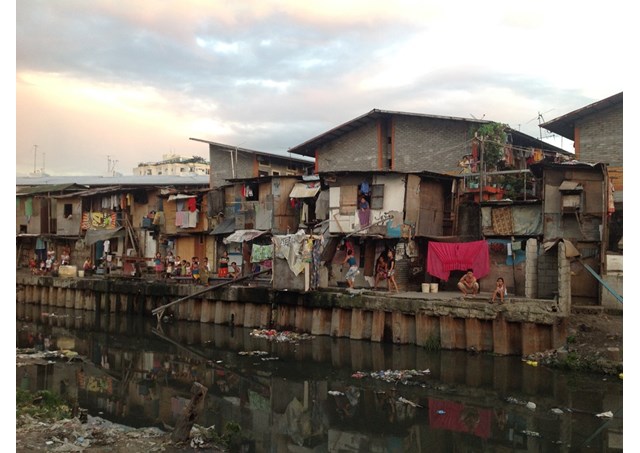
Metropolitan Manila: a visit to the depressed area of 'Malibay'

(Vatican Radio) Seàn-Patrick Lovett who heads the English programme of Vatican Radio is currently in the capital of the Philippines Manila, reporting on the Apostolic journey of Pope Francis there which is part of a visit to Asia. One which has already taken the pope to Sri Lanka.
On the day of the Pope's arrival on Thursday 15th of January Seàn-Patrick Lovett visited the depressed area of 'Malibay' where three young Rogationist priests live in order to identify with the people they serve.
Listen to Seàn-Patrick Lovett's report from Manila:
Take a good look at the photograph that illustrates this article. It’s a picture I took the day the Pope arrived in the Philippines. It’s along the route of the papal motorcade and I’m hoping, if they didn’t drive by too fast, that he saw it too. The real thing, that is.
Here in the Philippines, the real thing is still the proverbial “elephant in the room”. It’s the one thing that no one can really avoid talking about but that everyone (for one reason or another) chooses to ignore. Poverty. There are those who continue to refute the evidence before their very eyes and to deny it exists. There are others who claim that, if it is there, they just haven’t “noticed” it. And others still who insist that if nearly one third of the population lives in poverty it is (for obscure reasons they can’t explain) their “own fault”.
So let’s begin with what really is before our very eyes, right here in Metropolitan Manila.
The Philippine’s capital city is one of the 10 largest metropolises in the world. With a population of over 11 million people (and counting) it’s also one of the fastest growing. Now, I’m no maths genius, but even I can figure out that one third of 11 million equals around 3.6 million (give or take a few thousand) – people, that is. Hard to miss, I’d say.
So how to explain the attitude of those who “are so blind they will not see”?
Perhaps because of the way poverty is lived here. There is a dignity, a resilience, a determination, which is hard to describe. There is also a unique solidarity and sense of community, supported by deep religiosity and expressed in popular piety, which is not quite the same as anywhere else.
Does that make sense? Let me give you a concrete example.
Malibay is a so-called “depressed area” (a euphemism used to avoid saying the ugly word “slum”) within Pasay City, which is itself part of Metropolitan Manila. In short, it’s the agglomeration of shacks you can see bordering the garbage river in the picture. More and more people move here every year from the countryside in search of survival. Those who succeed often do so thanks to the very concrete help they receive from Catholic Church groups and religious communities – like the Rogationists.
Dexter, Orville and Joseph are three young Filipino Rogationist priests who have taken the radical decision to live here, in Malibay, in order to identify completely with the poor people they serve. And, for these priests, service means refusing to resign themselves to a situation they insist the people themselves have the power to change. Which is why they have created “Empowerment & Sweat” projects that entail micro credit loans and land purchases which ultimately allow those who can (and who want to) to leave the slum and to build (by the sweat of their brow) permanent and dignified housing – while maintaining communities and families intact.
Of course, it doesn’t “solve” the problem of poverty. But it does demonstrate the solidarity, dignity and determination I was talking about earlier. It also confirms why Pope Francis has insisted that the emphasis of this papal visit to the Philippines be on them – the poor.
| All the contents on this site are copyrighted ©. |


